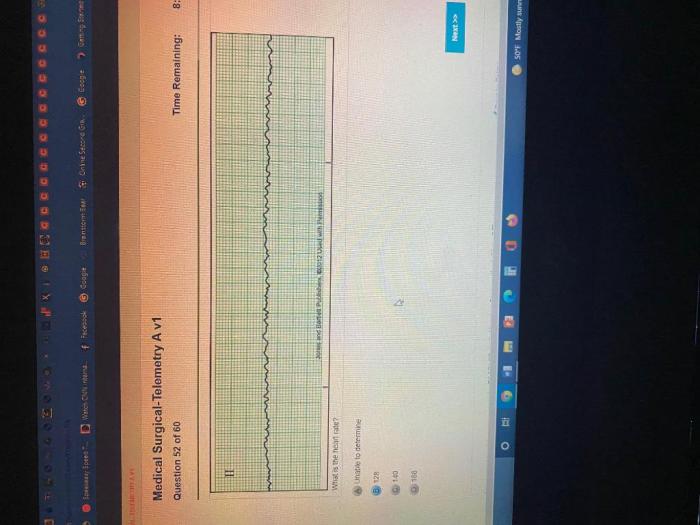Medical surgical rn b relias – Welcome to the realm of Medical-Surgical RN B Relias, where we delve into the captivating world of nursing practice. This comprehensive guide will provide an in-depth exploration of the responsibilities, skills, and advanced roles that define this vital profession.
From patient assessment and medication administration to wound care and interdisciplinary collaboration, we will uncover the intricacies of Medical-Surgical nursing. Along the way, we will shed light on ethical considerations and the pathways to advanced practice roles, empowering you with a thorough understanding of this dynamic and rewarding field.
Medical-Surgical Nursing Responsibilities

Medical-Surgical Registered Nurses (RNs) play a pivotal role in providing comprehensive care to patients in acute care settings. Their responsibilities encompass a wide range of duties that require specialized knowledge, skills, and a compassionate approach.
The primary duties of a Medical-Surgical RN include:
- Assessing and monitoring patients’ health status
- Administering medications and treatments
- Providing wound care and dressing changes
- Inserting and maintaining IV lines
- Educating patients and families about their health conditions
- Collaborating with other healthcare professionals to develop and implement patient care plans
Medical-Surgical RNs require specialized knowledge in areas such as:
- Anatomy and physiology
- Pathophysiology
- Pharmacology
- Medical-surgical nursing interventions
- Patient assessment techniques
They also possess essential skills in:
- Patient assessment and monitoring
- Medication administration
- Wound care
- IV therapy
- Patient education
- Critical thinking and problem-solving
Common procedures and interventions performed by Medical-Surgical RNs include:
- Vital sign monitoring
- Blood glucose monitoring
- Oxygen therapy
- Chest tube management
- Tracheostomy care
- Pain management
- Post-operative care
Medical-Surgical RNs play a crucial role in ensuring the well-being and recovery of patients in acute care settings. Their specialized knowledge, skills, and compassionate approach make them indispensable members of the healthcare team.
Medical surgical RNs are responsible for providing care to patients in a variety of settings, including hospitals and clinics. They are skilled in assessing, diagnosing, and treating a wide range of conditions. If you’re looking for a delicious and affordable meal in Boston, check out donde comer barato en boston . This website offers a comprehensive list of budget-friendly restaurants in the city.
Back to the topic of medical surgical RNs, they are also responsible for educating patients and their families about their conditions and treatment plans.
Patient Assessment and Monitoring

Comprehensive patient assessment is the cornerstone of Medical-Surgical nursing. It provides a baseline for understanding the patient’s health status, identifying potential problems, and developing an individualized plan of care.
Methods of Patient Assessment
Patient assessment involves various methods, including:
- Physical Examination:Involves a thorough examination of the patient’s physical condition, including vital signs, skin, head, neck, chest, abdomen, extremities, and neurological status.
- Vital Signs:Regular monitoring of temperature, pulse, respirations, and blood pressure provides vital information about the patient’s overall health and response to treatment.
- Medical History:Gathering information about the patient’s past and present health conditions, medications, allergies, and lifestyle factors helps identify potential risk factors and areas of concern.
Role of Medical-Surgical RNs in Monitoring Patient Progress
Medical-Surgical RNs play a crucial role in monitoring patient progress and identifying potential complications. They:
- Regularly Assess Vital Signs:Monitor vital signs to detect any changes that may indicate a decline in the patient’s condition or a need for intervention.
- Observe Patient Behavior and Response:Pay attention to changes in the patient’s behavior, appearance, and response to treatment, as these may indicate underlying problems.
- Document and Communicate Findings:Accurately document and communicate any changes or concerns to the healthcare team, ensuring timely intervention and appropriate care.
Medication Administration and Management
Medication administration is a critical aspect of Medical-Surgical nursing, requiring nurses to ensure the safe and effective delivery of medications to patients. Understanding the principles of medication administration, different routes, and responsibilities of RNs is essential for providing optimal patient care.
Principles of Safe and Effective Medication Administration
RNs adhere to strict principles to ensure medication safety:
- The Five Rights:Confirming the right patient, right medication, right dose, right route, and right time.
- Patient Assessment:Evaluating the patient’s condition, allergies, and potential drug interactions before administering medications.
- Accurate Measurement:Using calibrated measuring devices and double-checking measurements to ensure precise dosage.
- Proper Technique:Following established protocols for each route of administration to minimize errors and maximize effectiveness.
- Patient Education:Informing patients about their medications, including purpose, dosage, and potential side effects.
Wound Care and Management

Wound care and management are crucial aspects of Medical-Surgical nursing, as they play a vital role in preventing infections, promoting healing, and ensuring patient comfort. Medical-Surgical RNs are responsible for assessing, dressing, and monitoring wounds to ensure optimal outcomes.
Types of Wounds
- Acute Wounds:These are wounds that occur suddenly, such as surgical incisions, lacerations, or burns.
- Chronic Wounds:These are wounds that persist for more than 4 weeks and fail to heal normally, such as pressure ulcers, diabetic ulcers, or venous stasis ulcers.
Wound Assessment
Before initiating wound care, Medical-Surgical RNs must conduct a thorough assessment to determine the type, size, location, and severity of the wound. They also evaluate the surrounding skin, note any signs of infection, and assess the patient’s pain level.
Wound Dressing
The appropriate wound dressing depends on the type and stage of the wound. Common dressings include:
- Dry dressings:Used for superficial wounds that are not actively draining.
- Moist dressings:Promote wound healing by keeping the wound moist and protected.
- Hydrocolloid dressings:Absorbent dressings that create a moist environment and promote healing.
Wound Monitoring
After dressing the wound, Medical-Surgical RNs must monitor it regularly to assess its progress and identify any signs of infection or complications. This includes checking for redness, swelling, pain, or drainage.
Patient Education and Support

Patient education and support are fundamental aspects of Medical-Surgical nursing. They empower patients and their families with knowledge and skills to manage their health conditions effectively.
Medical-Surgical RNs play a crucial role in providing clear and understandable information to patients. They explain diagnoses, treatment plans, medications, and self-care measures. Effective patient education strategies include using plain language, providing written materials, and involving family members in the learning process.
Patient Education Resources
Numerous resources are available to support patient education, including:
- Patient handouts and brochures
- Online health information websites
- Support groups
- Community health centers
- Mobile health apps
Interdisciplinary Collaboration

Interdisciplinary collaboration is paramount in Medical-Surgical nursing, fostering a cohesive healthcare team that optimizes patient outcomes. It involves effective communication, shared decision-making, and mutual respect among various healthcare professionals.
Physicians, pharmacists, and social workers play pivotal roles in patient care. Physicians provide medical diagnosis and treatment plans, while pharmacists ensure safe and effective medication administration. Social workers address patients’ psychosocial needs, facilitating their overall well-being and adherence to treatment plans.
Collaborative Approaches
- Case Conferences:Regular meetings where the healthcare team discusses patient cases, reviews progress, and develops comprehensive care plans.
- Shared Electronic Health Records:Centralized platforms that allow seamless sharing of patient information, promoting continuity of care and reducing errors.
- Interdisciplinary Rounds:Team visits to patients, enabling direct communication, assessment, and plan adjustments based on collective expertise.
Ethical Considerations in Medical-Surgical Nursing

Medical-Surgical nursing practice presents various ethical considerations that nurses must navigate to ensure patient well-being and uphold professional standards. These ethical principles guide decision-making and shape interactions with patients, families, and healthcare providers.
Patient Autonomy
Patient autonomy refers to the patient’s right to make decisions about their own healthcare, including treatment options and end-of-life care. Nurses respect this autonomy by providing clear and understandable information, ensuring patients fully comprehend the potential risks and benefits of various choices.
Confidentiality
Confidentiality is paramount in medical-surgical nursing. Nurses maintain the privacy of patient information, including medical records, conversations, and observations. They safeguard this information from unauthorized access and disclosure, ensuring patients feel comfortable sharing sensitive information.
Informed Consent
Informed consent involves obtaining the patient’s voluntary agreement to undergo medical procedures or treatments after they have received complete and accurate information about the risks, benefits, and alternatives. Nurses play a crucial role in ensuring patients understand the implications of their decisions and make informed choices.
Ethical Dilemmas
Medical-Surgical RNs may encounter ethical dilemmas when patient preferences conflict with medical recommendations or legal requirements. For example, a patient may refuse life-sustaining treatment, or a nurse may have concerns about a patient’s capacity to make informed decisions. In such situations, nurses consult with colleagues, seek ethical guidance, and prioritize the patient’s well-being while adhering to ethical principles.
Advanced Practice Roles for Medical-Surgical RNs: Medical Surgical Rn B Relias
Medical-Surgical Registered Nurses (RNs) play a vital role in providing comprehensive care to patients in various healthcare settings. Advanced Practice Roles (APRs) offer Medical-Surgical RNs opportunities for career advancement and expanded responsibilities. These roles require additional education and training beyond the traditional RN licensure.
Nurse Practitioner (NP), Medical surgical rn b relias
NPs are Advanced Practice Registered Nurses (APRNs) who have obtained a Master’s or Doctorate degree in Nursing. They are licensed to provide a wide range of healthcare services, including:
- Performing physical exams
- Diagnosing and treating illnesses
- Prescribing medications
- Ordering and interpreting diagnostic tests
- Providing patient education and counseling
NPs work collaboratively with physicians and other healthcare professionals to deliver high-quality, patient-centered care. They are often found in primary care, urgent care, and specialty clinics.
Clinical Nurse Specialist (CNS)
CNSs are APRNs who have obtained a Master’s or Doctorate degree in Nursing with a focus on a specific area of practice, such as critical care, oncology, or geriatrics. They are experts in their field and provide advanced nursing care to patients with complex health conditions.CNSs
play a vital role in:
- Developing and implementing evidence-based care plans
- Providing expert consultation to other healthcare professionals
- Educating patients and families about their health conditions
- Conducting research to improve patient outcomes
CNSs work in a variety of settings, including hospitals, clinics, and long-term care facilities.
Contribution to Healthcare Delivery
Advanced Practice RNs, including NPs and CNSs, contribute significantly to the delivery of high-quality healthcare in Medical-Surgical settings. They:
- Provide timely and accessible care to patients
- Improve patient outcomes through evidence-based practices
- Reduce healthcare costs by preventing unnecessary hospitalizations and readmissions
- Enhance patient satisfaction by providing personalized and compassionate care
As the healthcare landscape continues to evolve, Advanced Practice Roles for Medical-Surgical RNs will become increasingly important in meeting the growing demand for high-quality, cost-effective healthcare services.
FAQ Insights
What are the key responsibilities of a Medical-Surgical RN?
Medical-Surgical RNs are responsible for providing comprehensive care to patients in a variety of settings, including hospitals, clinics, and long-term care facilities. Their duties include patient assessment, medication administration, wound care, patient education, and collaboration with other healthcare professionals.
What specialized knowledge and skills are required for Medical-Surgical RNs?
Medical-Surgical RNs require a strong foundation in nursing principles, as well as specialized knowledge in medical-surgical conditions, pharmacology, and wound care. They must also possess excellent communication, critical thinking, and problem-solving skills.
What are the different advanced practice roles available to Medical-Surgical RNs?
Medical-Surgical RNs can pursue advanced practice roles such as Nurse Practitioner (NP) and Clinical Nurse Specialist (CNS). These roles allow RNs to provide a wider range of services, including diagnosing and treating illnesses, prescribing medications, and managing complex patient cases.